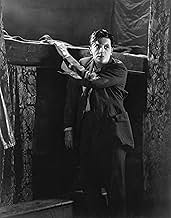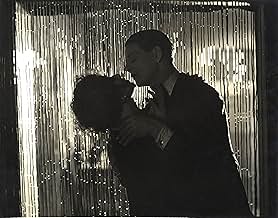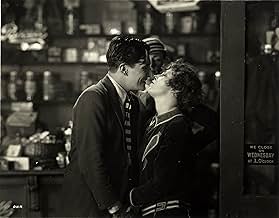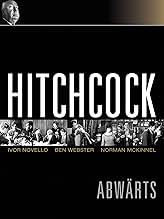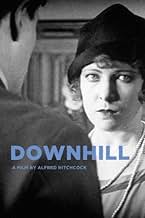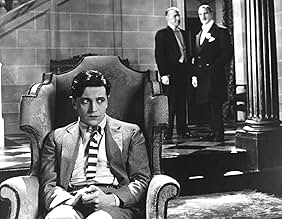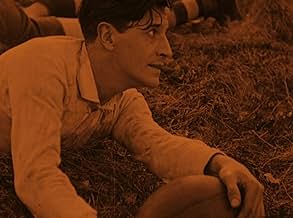NOTE IMDb
6,0/10
3,3 k
MA NOTE
L'écolier Roddy Berwick est expulsé de son école quand son ami lui fait porter le chapeau et sa vie s'effondre en une série de mésaventures.L'écolier Roddy Berwick est expulsé de son école quand son ami lui fait porter le chapeau et sa vie s'effondre en une série de mésaventures.L'écolier Roddy Berwick est expulsé de son école quand son ami lui fait porter le chapeau et sa vie s'effondre en une série de mésaventures.
- Réalisation
- Scénario
- Casting principal
Constance Collier
- Dance Hall Lady with Purse
- (non crédité)
Daisy Jackson
- The Seductive Waitress
- (non crédité)
Avis à la une
'Downhill' is visually inventive and astonishing, but the story is nothing more than simple flat melodrama. Script is based on the play "Down Hill" written by Constance Collier and the film's star Ivor Novello. Roddy Berwick (Ivor Novello) and Tim Wakely (Robin Irvine) are best buddies attending expensive private school. Soon after both boys spend an evening with waitress (Annette Benson), she comes forward and says she's pregnant. She accuses Roddy, who comes from the rich family, being the father, while the real one is Tim. Roddy promises to keep his mouth to protect Tim, who might lose his scholarship. Roddy gets expelled from school, and thrown out at home by his father. Roddy falls deeper and deeper after being used by different people. Hitchcock fantastically depicts Roddy's descent after each dramatic episode with showing Novello's character going down on stairs, on escalators and with elevator.
Not the Hitchcock's best movie - directing is marvelous, but the story is just too simple and predictable. On the other hand, it is very easy to care about the main character and despise the cruel people who but other persons through unfair grind (even when things happen thanks to Roddy's own naivety).
P.S. At that time (in August, 2018) the film's theme is still relative.
Not the Hitchcock's best movie - directing is marvelous, but the story is just too simple and predictable. On the other hand, it is very easy to care about the main character and despise the cruel people who but other persons through unfair grind (even when things happen thanks to Roddy's own naivety).
P.S. At that time (in August, 2018) the film's theme is still relative.
I watched Alfred Hitchcock's DOWNHILL (1927) starring Ivor Novello. I thought this was a fascinating film although it's not very well regarded.
Novello plays a wealthy Oxford student who stupidly takes the blame after a vindictive waitress points him out (his father is rich) as her seducer. The real seducer is his friend, but he takes the blame, assuming it will all blow over. But he gets expelled and sent home where his father pitches a fit and calls him a liar. Novello storms out of the house.
Cast into the cruel world, Novello must find his own way. In a brilliant sequence, following an intertitle that announces "make believe" we see a well dressed Novello holding a cup of coffee, but as the camera pulls back we see that he is holding a tray and serving coffee to a flashy couple (Isabel Jeans, Ian Hunter). Well at least he has a job! But then as the couple heads to the dance floor the camera pulls back again and we suddenly realize that, as the couple starts dancing, they are on a stage. The audience comes into view and a line of high-kicking dancers races out onto the stage.
Jeans turns out to be a selfish woman involved with Hunter. There is never enough money. Novello becomes a hanger-on until he receives a telegram with news about an inheritance. Jeans quickly marries Novello and starts spending freely. Time passes. Jeans and Hunter are sitting in a lavish bedroom. She's endlessly sitting at dressing tables, admiring herself and her jewels. Novello comes home and find a pile of bills, an overdrawn notice from the bank, and Hunter in the closet. The apartment is in her name and he's thrown out into the cruel world.
Next we find Novello as a taxi dancer in Paris. He seems to have a "manager" who sells his dances and possibly more. While he dances we see a middle-aged age woman (Violet Farebrother) sitting at a table. She can't take her eyes off him. She arranges for an introduction. He babbles away, telling her his sad story while her eyes frankly devour him. Amazing sequence. But as morning dawns and the blinds are raised, Novello finally see this tawdry world of drunks and dissolutes and once again goes out into the cruel world to Marseilles.
Sick and broke, Novello is saved by a pair of sailors and put on a ship back to England after they find a returned letter. Do they think there will be a reward? During the voyage, Novello hallucinates and relives his past accounts with all the horrid women in his life. This is a beautifully done scene. Finally he arrives home.
I cannot think of another film from this era where the male is the societal victim and who, through nobility, suffers as he descends to the depths at the hands of women. Novello is actually playing a twist on the many Ruth Chatterton roles where she follows this sort of journey to find redemption and/or death. Along with The Lodger, this may be Ivor Novello's best film performance.
As for Hitchcock, there are many great scenes here and lots of symbolism as Novellos is seen on escalators and elevators going down, down, DOWN.
Novello plays a wealthy Oxford student who stupidly takes the blame after a vindictive waitress points him out (his father is rich) as her seducer. The real seducer is his friend, but he takes the blame, assuming it will all blow over. But he gets expelled and sent home where his father pitches a fit and calls him a liar. Novello storms out of the house.
Cast into the cruel world, Novello must find his own way. In a brilliant sequence, following an intertitle that announces "make believe" we see a well dressed Novello holding a cup of coffee, but as the camera pulls back we see that he is holding a tray and serving coffee to a flashy couple (Isabel Jeans, Ian Hunter). Well at least he has a job! But then as the couple heads to the dance floor the camera pulls back again and we suddenly realize that, as the couple starts dancing, they are on a stage. The audience comes into view and a line of high-kicking dancers races out onto the stage.
Jeans turns out to be a selfish woman involved with Hunter. There is never enough money. Novello becomes a hanger-on until he receives a telegram with news about an inheritance. Jeans quickly marries Novello and starts spending freely. Time passes. Jeans and Hunter are sitting in a lavish bedroom. She's endlessly sitting at dressing tables, admiring herself and her jewels. Novello comes home and find a pile of bills, an overdrawn notice from the bank, and Hunter in the closet. The apartment is in her name and he's thrown out into the cruel world.
Next we find Novello as a taxi dancer in Paris. He seems to have a "manager" who sells his dances and possibly more. While he dances we see a middle-aged age woman (Violet Farebrother) sitting at a table. She can't take her eyes off him. She arranges for an introduction. He babbles away, telling her his sad story while her eyes frankly devour him. Amazing sequence. But as morning dawns and the blinds are raised, Novello finally see this tawdry world of drunks and dissolutes and once again goes out into the cruel world to Marseilles.
Sick and broke, Novello is saved by a pair of sailors and put on a ship back to England after they find a returned letter. Do they think there will be a reward? During the voyage, Novello hallucinates and relives his past accounts with all the horrid women in his life. This is a beautifully done scene. Finally he arrives home.
I cannot think of another film from this era where the male is the societal victim and who, through nobility, suffers as he descends to the depths at the hands of women. Novello is actually playing a twist on the many Ruth Chatterton roles where she follows this sort of journey to find redemption and/or death. Along with The Lodger, this may be Ivor Novello's best film performance.
As for Hitchcock, there are many great scenes here and lots of symbolism as Novellos is seen on escalators and elevators going down, down, DOWN.
Classmates and close friends at an English public school, Roddy Berwick and Tim Wakely compete for the affections of a local shop girl. When the girl falsely accuses Roddy of getting her pregnant, he is expelled. However, Roddy remains silent to protect Tim, who was the guilty party, and the friends make a pact to keep silent. Outraged at his expulsion, Roddy's father does not believe his son's claims of innocence and throws him out. Thus, Roddy strikes out on his own, and his life begins a downward spiral from stage acting to a disastrous marriage to taxi dancing to the Marseilles waterfront. "When Boys Leave," also known as "Downhill," was Alfred Hitchcock's fifth completed film, and, early on in his career, the master director explores his oft-repeated theme of the wrongfully accused.
Shot in 1927, the film is silent with inter-titles, and the black-and-white cinematography is often well lit with striking visual compositions. However, Hitchcock generally holds the camera steady, and movement occurs within the frame. The film lacks the camera fluidity common among movies of the late silent era, although Hitchcock is already a master of visual story-telling, and the inter-titles are brief and sparse. As Roddy's life reels out of control, he is dwarfed by his surroundings in rooms with impossibly high ceilings and doors that are more than twice his height. Fortunately, Hitchcock elicits naturalistic performances from his cast, and none indulges in the grand style of acting that negatively stereotyped silent movies. Ivor Novello, a Welsh matinée idol best known for his musical talents, plays the suffering Roddy quite well. Isabel Jeans as Julia Fotheringale, a spendthrift actress, and Ian Hunter as Archie, Julia's shady lover, provide amusing support during one colorful episode in Roddy's descent.
"When Boys Leave" is from Hitchcock's apprentice period in England, when he was still learning the craft. While the story is thin, and the motivations vague, this short silent film shows flashes of the genius to come, and, for students of the master, every Hitchcock film is worthwhile viewing.
Shot in 1927, the film is silent with inter-titles, and the black-and-white cinematography is often well lit with striking visual compositions. However, Hitchcock generally holds the camera steady, and movement occurs within the frame. The film lacks the camera fluidity common among movies of the late silent era, although Hitchcock is already a master of visual story-telling, and the inter-titles are brief and sparse. As Roddy's life reels out of control, he is dwarfed by his surroundings in rooms with impossibly high ceilings and doors that are more than twice his height. Fortunately, Hitchcock elicits naturalistic performances from his cast, and none indulges in the grand style of acting that negatively stereotyped silent movies. Ivor Novello, a Welsh matinée idol best known for his musical talents, plays the suffering Roddy quite well. Isabel Jeans as Julia Fotheringale, a spendthrift actress, and Ian Hunter as Archie, Julia's shady lover, provide amusing support during one colorful episode in Roddy's descent.
"When Boys Leave" is from Hitchcock's apprentice period in England, when he was still learning the craft. While the story is thin, and the motivations vague, this short silent film shows flashes of the genius to come, and, for students of the master, every Hitchcock film is worthwhile viewing.
As a huge Hitchcock fan, Downhill was an interesting film but while not among his weakest it is a long way from being among his best. The acting is not bad at all, in fact decent(likewise with the chemistry between them), Ivor Novello's performance is expressive and moving if not always subtle, Isabel Jeans is a sympathetic Julia and Annette Benson makes Mabel's scheming believable. Ian Hunter is also very naturalistic in his role. The production values and Hitchcock's direction are Downhill's best qualities, both are superb. The film is really beautifully shot, some of the best and most ahead-of-its-time photography of any of Hitchcock's silent films. The choice of locations are appropriate and well-utilised, particularly with the scenes set in the nightclub and theatre. The hand-held camera shots signifying Roddy's delirium, the slow pan shot during the dance in the Parisian hall scene and the long pulling-back shot with us thinking that Roddy is dressing for a fancy night, then us thinking that he is waiter and then we realise that he is on the stage stand out as being especially good technically. Hitchcock wasn't yet in his comfort zone, but his direction not only shows technical skill but also early in his career being able to show the psychological insight that he was often so good at. As well as enhancing the mood. From a narrative standpoint unfortunately Downhill falls far short in comparison, for all how strong his visuals and direction are Hitchcock apparently had little interest in the story and it comes through loud and clear. The story creaks that wooden floorboards in a deserted house, makes very little sense and does drag quite badly at times. The characters are not very interesting and often one-sided which, especially with the female characters, may leave a sour taste in the mouth. The script touches on the social hypocrisy and the separation of classes- morally mostly- but to me it does very little with those themes and while interesting for when and where Downhill was set it doesn't hold up well today. On the whole, a mixed view here, loved it technically, didn't care for it narratively. 5/10 Bethany Cox
My copy of this movie is truly silence with no musical score. Whenever I watch a movie that is completely silent, initially I find it a little hard. But when the film is well made, as this one is, it doesn't take long to adjust and focus on the story as you are drawn into it. I feel Hitchcock was a master of the silent film genre with his ability to tell such a deep story with very few intertitles. Relying instead on the expressions of the actors and written notes and signs in the movie, without having to cut away to an intertitle, which allows the film to flow more fluidly instead of constant cutting between the live action and the title cards. Ivor Novello in the lead role of Roddy and in his prior work with Hitchcock in The Lodger really impressed me with his talent of conveying his feelings strictly through facial expressions and acting without the use of sound. Hitch is also good at using subtle exaggeration and focus on action to help take the place of the sound in his silent films.
The story is that of a young man in school who is falsely accused of theft by a lady that he had danced with and he is willing to take the blame for a friend of his and is expelled from school. This leads to the downhill spiral of his life as leaves home after his father calls him a "LIAR!". Things get worse from there as ends up working as a gigolo in Paris, getting in fights, losing a large sum of money, and eventually hitting bottom.
In this film we really begin seeing a lot of Hitchcock's visual style that he is so famous for. He has some really good use of fades and graphic matches between scenes. Two of my favorite where the fading out on the pocket watch and into a large clock, and the other being the scene where he fades out on a photograph and then back in on the real person. I really enjoyed the symbolic shot of Roddy heading down the escalator, showing us that is in heading downhill in his life. And my favorite "Hitch" shot in this movie was the point-of-view shot when the lady was leaning back in her chair and it cuts to Roddy walking into the room and we see him upside down on the screen. I also thought Hitchcock did a great job of portraying Roddy's seasickness towards the end of the film. I really enjoy seeing Hitchcock's style developing in his early silent films, that will become so prominent in his later, more famous movies. I also really appreciate Hitch's working in comedic scenes into his serious movies. My favorite humorous scene in this movie is the peashooter scene early in the film.
Without giving too much away, I would have liked to see a more typical Hitchcock ending to this film.
*** (out of 4 stars)
The story is that of a young man in school who is falsely accused of theft by a lady that he had danced with and he is willing to take the blame for a friend of his and is expelled from school. This leads to the downhill spiral of his life as leaves home after his father calls him a "LIAR!". Things get worse from there as ends up working as a gigolo in Paris, getting in fights, losing a large sum of money, and eventually hitting bottom.
In this film we really begin seeing a lot of Hitchcock's visual style that he is so famous for. He has some really good use of fades and graphic matches between scenes. Two of my favorite where the fading out on the pocket watch and into a large clock, and the other being the scene where he fades out on a photograph and then back in on the real person. I really enjoyed the symbolic shot of Roddy heading down the escalator, showing us that is in heading downhill in his life. And my favorite "Hitch" shot in this movie was the point-of-view shot when the lady was leaning back in her chair and it cuts to Roddy walking into the room and we see him upside down on the screen. I also thought Hitchcock did a great job of portraying Roddy's seasickness towards the end of the film. I really enjoy seeing Hitchcock's style developing in his early silent films, that will become so prominent in his later, more famous movies. I also really appreciate Hitch's working in comedic scenes into his serious movies. My favorite humorous scene in this movie is the peashooter scene early in the film.
Without giving too much away, I would have liked to see a more typical Hitchcock ending to this film.
*** (out of 4 stars)
Le saviez-vous
- AnecdotesThe £30,000 Roddy inherits would have equated to about $143,000 at the time (in 1927), and that amount equals over $2.5M in 2023.
- GaffesWhen Roddy and the girl are dancing in the candy shop, a gramophone record of a tune called "I Want Money" is shown. It's on the old "WINNER" label. In a flashback, it's playing again on the record player, but in a further flashback, in a montage, the record has become a "His Master's Voice" disc.
- Citations
[first title card]
Title Card: Here is a tale of two school-boys who made a pact of loyalty. One of them kept it - at a price.
- ConnexionsFeatured in Shepperton Babylon (2005)
- Bandes originalesI Want Some Money
Words by Herbert Rule & Fred Holt.
Music by L. Silberman.
Played on the gramophone machine by Mabel; even though Downhill is a silent film, the accompanying music would have referenced this song as it underscores elements of the plot.
Meilleurs choix
Connectez-vous pour évaluer et suivre la liste de favoris afin de recevoir des recommandations personnalisées
Détails
Box-office
- Montant brut mondial
- 158 $US
- Durée1 heure 20 minutes
- Couleur
- Mixage
- Rapport de forme
- 1.33 : 1
Contribuer à cette page
Suggérer une modification ou ajouter du contenu manquant

Lacune principale
By what name was C'est la vie (1927) officially released in India in English?
Répondre
